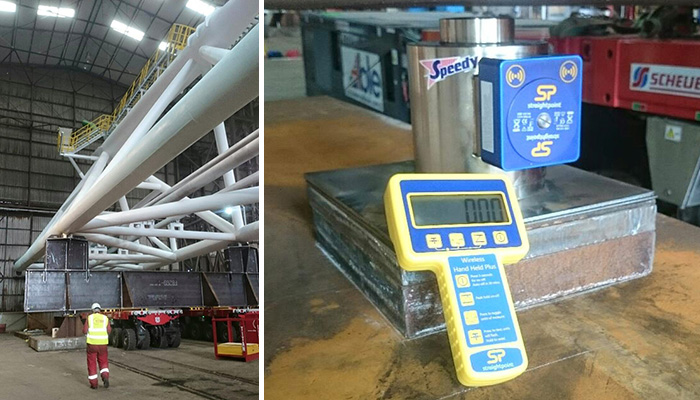Straightpoint Load Cells Weigh Hulking Flare Stack

Speedy Services used load monitoring and suspended weighing load cell equipment from Straightpoint to weigh and calculate the centre of gravity of a 298t flare stack bound for a BP oil rig in the North Sea.
Speedy utilised four 150t wireless compression load cells and wireless centre of gravity software with supplementary SW-HHP handheld displays.
The load cells were chosen for a number of reasons, chiefly because they offered an accuracy of +/- 0.5%, compared to other units that were considered which provided a wider margin of +/- 1%.
Accurate measurement of the stack was so critical that weighing was carried out under a shelter to prevent rainwater impacting the calculations. The fabrication shed in Aberdeen, Scotland had to be large enough therefore to house the 98m-long flare stack. It took approximately five hours to complete the load out.
Terry Bide, depot manager at Speedy Services, was responsible for sourcing suppliers for the project that could manufacture to the specified tolerances and deliver to the stringent timescales enforced by the oil and gas giant.
He said: “The weighing technology was integral to the safe completion of a job that required extensive lift planning and top level expertise from the lifting industry throughout. It would have had a massive impact when the unit is finally installed to find the weight or centre of gravity was even slightly incorrect and the crane onsite rendered unsuitable.”
He added: “Thus, the contractor, working on behalf of BP, specified at the outset that they required highly accurate weighing technology. The load was nearly 90m-long, while the average for a flare stack of this kind is much smaller, say, 60m. The success of the project was owing to the industry-leading technologies and expertise employed.”
Self-propelled modular transporters (SPMT) were used to jack the flare stack prior to load out. Flare stacks are sometimes called gas flares and are commonly installed as combustion devices on industrial plants such as petroleum refineries.
An SPMT was positioned at each end of the stack beneath supports that secured the flare in position. The load cells reported live information from four pick points to a handheld device, where operatives monitored the weighing procedure from a safe distance.
Bide concluded: “Given the critical role played by the weighing and other equipment on what was a successful project, I wouldn’t hesitate to utilise the technologies again for future oil and gas or other applications of this scale.”
The stack remains on the Aberdeen dockside awaiting completion of its accompanying module before transportation to the North Sea site.



